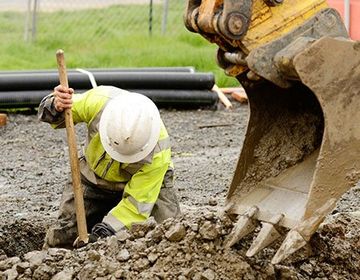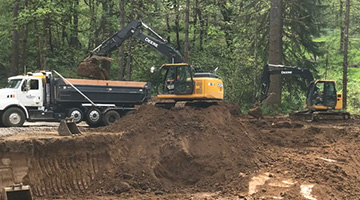Economical Lancaster Excavation - Top Quality Excavation at Competitive Rates
Economical Lancaster Excavation - Top Quality Excavation at Competitive Rates
Blog Article
Comprehensive Excavation Methods: Understanding the Principles for Success
In the realm of building and construction and civil engineering, the value of efficient excavation methods can not be overstated. The cautious preparation, accurate execution, and precise focus to detail called for in excavation projects demand a thorough method that encompasses numerous essential elements. From preliminary soil analysis to the execution of precaution and routine progress surveillance, understanding these core aspects is important for achieving success in any kind of excavation undertaking. The real mastery lies not merely in recognizing these principles however in effortlessly incorporating them to navigate the complexities of excavation jobs with skill.
Understanding Excavation Job Preparation

The preliminary stage of any excavation job is the planning phase, where crucial choices are made that can considerably influence the end result of the job. Understanding the project budget, extent, and timeline restraints is critical for producing an extensive excavation strategy that makes sure the project's success.
One secret element of excavation job planning is the development of a comprehensive timeline that details the sequence of tasks, turning points, and due dates. This timeline offers as a roadmap for the project group, enabling them to track development and make needed changes to ensure the job remains on timetable. Furthermore, a well-defined budget plan that represents all costs, consisting of equipment service, labor expenses, and products, is vital for staying clear of expense overruns and delays. By carefully considering all these aspects during the drawing board, excavation projects can be implemented efficiently and effectively, causing successful end results.
Soil Evaluation and Site Analysis
Performing extensive dirt analysis and site analysis is an important action in the prep work phase of any kind of excavation task. Dirt evaluation involves figuring out the make-up, framework, and residential properties of the dirt at the excavation site. This details is vital for understanding the soil's bearing capacity, dampness web content, and potential for disintegration, which are vital consider establishing the excavation techniques and devices needed for the task.
Site assessment exceeds dirt evaluation and encompasses a broader analysis of the general website conditions. This analysis consists of identifying any type of possible risks, such as below ground energies, environmental problems, or unpredictable terrain, that can influence the excavation process. By completely assessing the site, task supervisors can develop reliable excavation approaches that prioritize security, effectiveness, and environmental management.
Utilizing innovative modern technologies like ground-penetrating radar, soil sampling, and drone studies can improve the accuracy and effectiveness of soil evaluation and website assessment. Spending time and resources in these initial actions can inevitably save time and prevent pricey delays or issues during the excavation procedure.
Tools Choice and Use
Reliable excavation projects rely greatly on strategic equipment selection and utilization to make sure ideal efficiency and performance. Selecting the ideal devices for the job is essential in taking full advantage of efficiency and decreasing downtime. Factors such as the kind of soil, deepness of excavation, and task scope play a considerable role in establishing the most ideal tools for the task at hand.

Along with choosing the proper tools, correct application is crucial to project success. Operators must be trained to handle the equipment securely and efficiently - excavating ohio. Normal upkeep checks and timely repair work aid protect against malfunctions and ensure regular efficiency throughout the job
Safety And Security Actions and Regulations Conformity
In the world of excavation projects, prioritizing safety and security steps and compliance with regulations is critical to making certain a safe and legitimately audio functional atmosphere. Precaution encompass a series of methods, including performing detailed site evaluations, executing proper signs and barriers, and offering adequate safety training for all employees included in the excavation process. Adherence to laws, such as OSHA demands in the United States, guarantees that the excavation job meets the needed criteria to protect workers, onlookers, and the additional resources surrounding setting.

Monitoring Progress and Adjusting Approaches
How can project managers successfully track the improvement of excavation jobs and adjust their strategies as necessary to optimize outcomes? Tracking progress is important for guaranteeing that excavation tasks remain on track and fulfill target dates. Job managers can utilize numerous tools and methods to track progress, such as day-to-day development records, routine site inspections, and advanced tracking innovations like drones and GPS tracking systems. By constantly monitoring the task's development, supervisors can determine any type of possible delays or problems beforehand and take aggressive steps to resolve them.

Conclusion
In final thought, mastering the fundamentals of comprehensive excavation approaches is necessary for the success of any job. By recognizing job preparation, examining soil and site conditions, choosing suitable tools, adhering to safety laws, and monitoring progress, task managers can make sure a smooth and effective excavation procedure. Implementing these approaches will certainly bring about effective end results and minimize prospective dangers or troubles throughout the excavation task.
The initial phase of any kind of excavation task is the preparation phase, where critical decisions are made that can significantly affect the result of the project. Comprehending the job extent, budget, and timeline restrictions is essential for creating a detailed excavation strategy that makes sure the job's success.
Exactly how can forecast supervisors successfully track the development of excavation tasks and adapt their strategies appropriately to enhance end results? By very closely monitoring development and being eager to adjust techniques, task managers can enhance the general success of excavation tasks.
By comprehending job planning, examining dirt and site problems, choosing ideal tools, complying with safety guidelines, and keeping track of development, project supervisors can make certain a smooth and reliable check excavation procedure.
Report this page